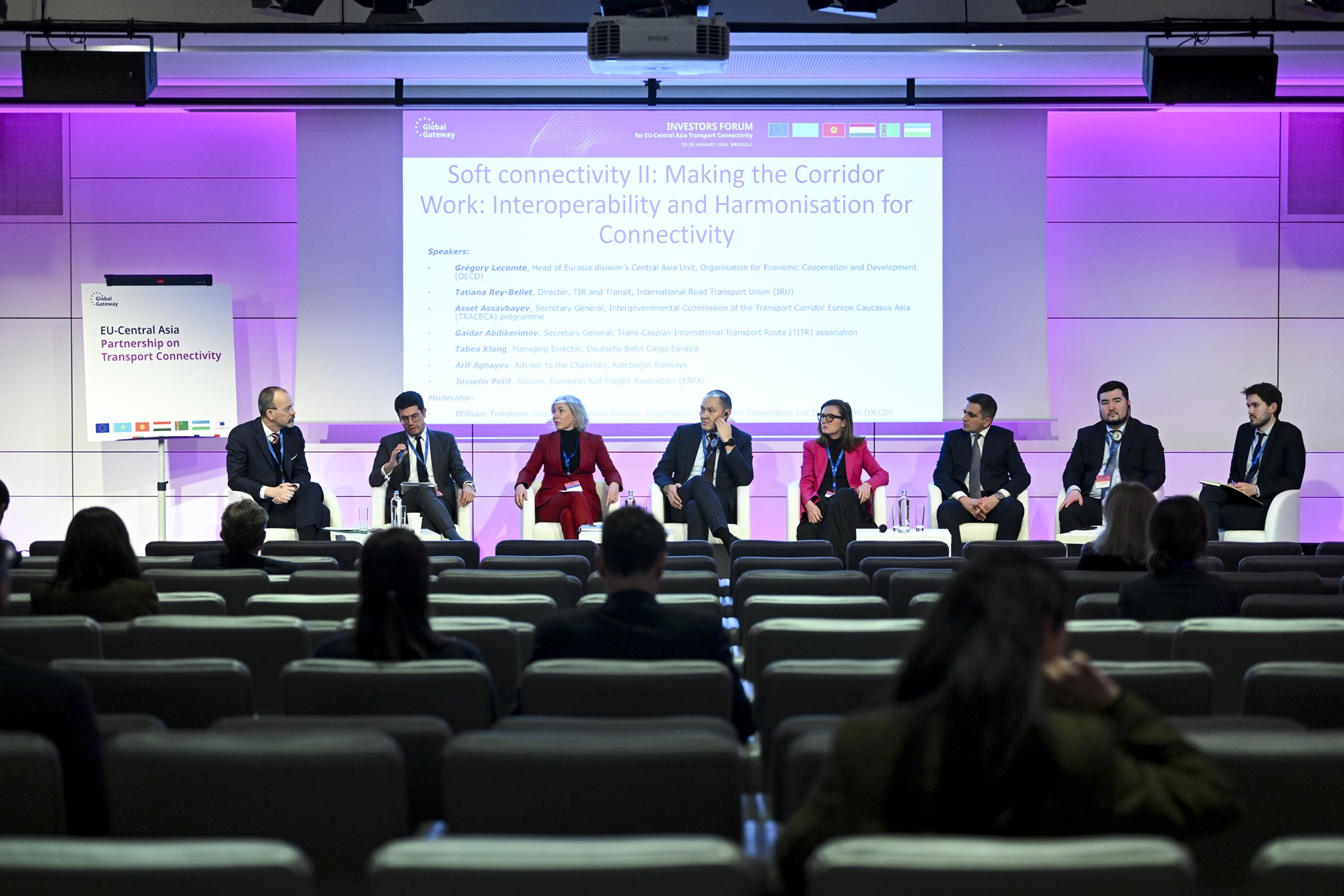The participants of the Global Gateway Investors Forum for EU-Central Asia Transport Connectivity from the European and international financial institutions have pledged €10 billion in support and investments for facilitating the sustainable development of the Trans-Caspian Transport Corridor (TITR).
The decision came on the heels of the two-day discussions in Brussels last week around the required investments to transform TITR into a cutting-edge, multimodal, and efficient route, connecting Europe and Central Asia within 15 days.
The €10 billion commitment includes ongoing and planned investments to be mobilized for developing transport connectivity in Central Asia in the short term.
As part of the support package, the European Investment Bank signed memoranda of understanding totaling €1.47 billion with the government and Development Bank of Kazakhstan, as well as the governments of Kyrgyzstan, and Uzbekistan. The European Commission will guarantee the provision of these loans.
The European Bank for Reconstruction and Development also inked a memorandum of understanding with Kazakhstan for channeling €1.5 billion into the projects already under preparation for the all-inclusive development of transport connectivity in the Central Asian region.
TITR is emerging as a viable alternative for East-West transport connectivity, as Russia's “special operation” in Ukraine urges stakeholders to look for new safe links bypassing the war zone. Following the onset of the Russia-Ukraine war in February 2022 freight shipments shifted from conventional East-West routes to TITR, also known as the Middle Corridor, stretching from China to Europe.
Since 2022, the cargo deliveries on the Middle Corridor through regional countries, including Azerbaijan, grew considerably. The Azerbaijan Railways Company announced over 18 million tons of freight transportation, including about 7 million tons of transit cargo, in 2023.
TITR, established in 2017, is seen as the main pivot for realizing the high transit potential of the Central Asian and South Caucasus nations. Azerbaijan, Bulgaria, China, Georgia, Kazakhstan, Poland, Romania, and Türkiye are the TITR International Association member states.
In October 2023, Azerbaijan Railways, Kazakhstan Temir Zholy national railway, and Georgian Railway inked an agreement to establish a joint venture – Middle Corridor Multimodal – that would spearhead joint efforts for developing multimodal service on TITR.
The company acts as a one-stop platform for rendering services to guarantee delivery times and pursue a coordinated policy for offering better multimodal service on the China-Europe/Türkiye-China route.
In December 2023, Azerbaijan continued cargo shipments from China on the Middle Corridor. At least three container block trains transported import goods to Azerbaijan as of January 2024. Eight trains are scheduled to deliver transit freight to Azerbaijan, from where it will be supplied to the Black Sea port of Georgia. The average travel time of the trains on the China-Kazakhstan-Azerbaijan route is 8-10 days.
Compared to the Northern Corridor, the Middle Corridor provides a more cost-effective and faster trade route, cutting travel distance by 2,000 kilometers. Additionally, the Middle Corridor passes through more favorable climate conditions and reduces travel time by 15 days compared to sea routes. The Middle Corridor also presents immense opportunities for cargo traffic in Asia, enabling goods to reach the Middle East, North Africa, and the Mediterranean region by integrating port connections in Türkiye.
The strategic location of the Middle Corridor is expected to create significant economic opportunities, enabling South Caucasian and Central Asian countries to benefit from the $600 billion China-Europe trade annually. The development and deepening of Trans-Caspian cooperation will be facilitated by the establishment of logistics centers and free trade zones at the ports of Azerbaijan, Kazakhstan, and Turkmenistan, providing a boost to regional economies. By leveraging the benefits of the Middle Corridor effectively, the countries in the region can reap the rewards of increased trade and economic growth.







 Azerbaijan and Armenia started the process of demarcation of their border on Tuesday, with the installation of the first border markers based on ge...
Azerbaijan and Armenia started the process of demarcation of their border on Tuesday, with the installation of the first border markers based on ge...
 President Aliyev emphasized the critical role of the North-South Transport Corridor in fostering transport cooperation between Azerbaijan and Russi...
President Aliyev emphasized the critical role of the North-South Transport Corridor in fostering transport cooperation between Azerbaijan and Russi...
 Iran and Pakistan have signed eight cooperation documents in various fields, and agreed to strengthen ties to fight terrorism in the region.
Iran and Pakistan have signed eight cooperation documents in various fields, and agreed to strengthen ties to fight terrorism in the region.
 As the conflict between Ukraine and Russia escalates, the strategic importance of Kharkiv, Ukraine's second-largest city, has come sharply into focus.
As the conflict between Ukraine and Russia escalates, the strategic importance of Kharkiv, Ukraine's second-largest city, has come sharply into focus.
 Iranian President Ebrahim Raisi expressed Tehran’s readiness to participate in significant development projects in Sri Lanka during the inauguratio...
Iranian President Ebrahim Raisi expressed Tehran’s readiness to participate in significant development projects in Sri Lanka during the inauguratio...



